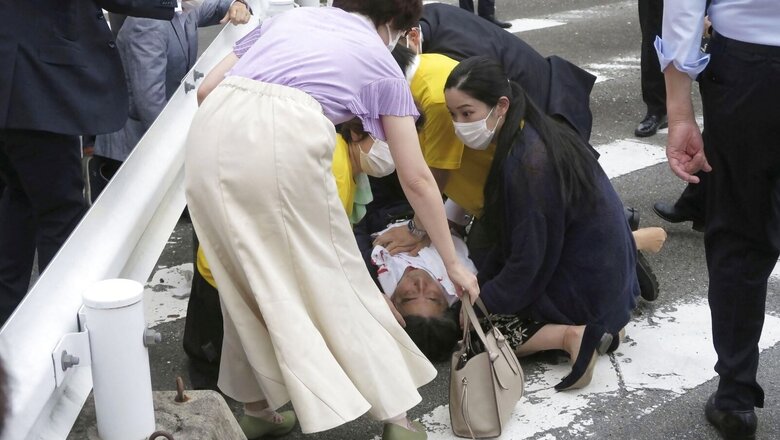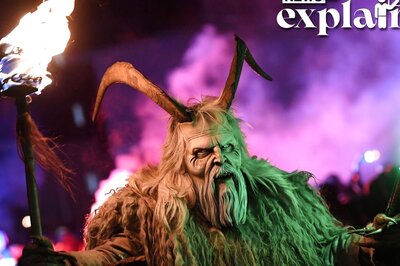
views
Japanese former Prime Minister Shinzo Abe, who was shot by an assailant while delivering a stump speech near a train station in Nara, has died, public broadcaster NHK said on Friday.
It was the first assassination of a sitting or former Japanese premier since the days of prewar militarism in the 1930s.
Speaking before Abe’s death was announced, Prime Minister Fumio Kishida condemned the shooting in the “strongest terms” while Japanese people and world leaders expressed shock at the violence in a country in which political violence is rare and guns are tightly controlled.
Abe, 67, was shot at a campaign event on Friday, a government spokesman said, as local media reported earlier in the day that the nation’s longest-serving premier was showing no vital signs. “Former prime minister Abe was shot at around 11:30 am,” in the country’s western region of Nara, chief cabinet secretary Hirokazu Matsuno told reporters. “One man, believed to be the shooter, has been taken into custody.”
Just after the incident, local media including national broadcaster NHK and the Kyodo news agency said Abe appeared to be in “cardiorespiratory arrest”, a term often used in Japan before a feared death can be officially confirmed by a coroner.
The attack on a man who may be Japan’s best-known politician comes despite the country’s famously low levels of violent crime and tough gun laws, and with politicians campaigning ahead of upper house elections on Sunday.
Footage broadcast by NHK showed him standing on a stage when a loud blast was heard with smoke visible in the air. As spectators and reporters ducked, a man was shown being tackled to the ground by security.
Local media identified the man as 41-year-old Tetsuya Yamagami, citing police sources, with several media outlets describing him as a former member of the Maritime Self-Defense Force, the country’s navy.
As the world comes to terms with the horrific attack, News18 takes a look at 10 prominent assassinations across the globe:
- Mahatma Gandhi (India): Oft labelled the ‘Father of the Nation’, Mohandas Karamchand Gandhi was instrumental in leading India to independence with the slogan of non-violence. Gandhi was on his way to a prayer meeting when he was assassinated on January 30, 1948 by Nathuram Godse who blamed Gandhi for the Partition and subsequent suffering faced by the people. According to Godse, instead of protesting against the atrocities faced by the minorities in Pakistan, Gandhi was busy fasting. He also asserted that Gandhi was the one who was responsible for making India weak as he insisted on making the payment to Pakistan.
- Indira Gandhi (India): The first female Prime Minister of India, Indira Gandhi was known for her fierce politics and is often remembered, among other things, for declaring a state of emergency in India. Indira Gandhi was assassinated by her bodyguards after Operation Blue Star on October 31, 1984, which aimed at gaining control over Harmandir Sahib Complex in Amritsar by removing Jarnail Singh Bhindranwale and his supporters from the premises. The Indian army carried out the operation, which led to resentment among the Sikh community and Indira Gandhi’s assassination was seen as revenge.
- Rajiv Gandhi (India): Rajiv Gandhi, the seventh PM of India, took charge after the assassination of his mother and then PM Indira Gandhi. He was assassinated by a suicide bomber in Sriperumbudur, near Chennai, on May 21, 1991. The attack on Gandhi was made by Thenmozhi Rajaratnam, also known as Dhanu. Liberation Tigers of Tamil Eelam (LTTE), a separatist organisation from Sri Lanka, was blamed for the attack. While Gandhi was campaigning in Sriperumbudur, Dhanu approached him and bent down to touch his feet, leading to an explosion in an RDX-laden belt. Along with Rajiv Gandhi, 14 others were also killed in the blast.
- Benazir Bhutto (Pakistan): The Pakistani leader was killed in a suicide bombing at an election rally in Rawalpindi in December 2007. Her assassination led to popular support for her party — the Pakistan Peoples’ Party — which won the largest number of seats in the polls held two months later.
- John F Kennedy (United States): Kennedy, one of the country’s most charismatic leaders, was shot twice by Lee Harvey Oswald while his motorcade drove through Dallas, Texas, in 1963. Two days later, Oswald too was gunned down by a night club owner. Many believed a larger conspiracy behind Kennedy’s assassination but nothing could be proven.
- Martin Luther King Jr (United States): The iconic American civil rights leader was fatally shot by James Earl Ray on a motel’s balcony in Memphis in 1968. The killing led to a period of national mourning that helped speed up the passage of an equal housing bill — the last major legislative achievement of the civil rights era.
- Qasem Soleimani (Iran): The top Iranian military commander was killed in an American drone strike on his motorcade in Baghdad on January 3, 2020. The killing led to Iran launching missiles on two America military bases in Iraq on January 8. During the offensive, Iranian forces also mistakenly downed a Ukrainian passenger aircraft, killing all 176 onboard.
- Abraham Lincoln (United States): Abraham Lincoln was one of the most loved Presidents of the USA. He was watching a play at Ford’s Theatre in Washington DC on April 14, 1865, without any bodyguards when John Wilkes Booth crept up from behind and shot him in the head at point-blank range.
- Muammar Gaddafi (Libya): Gaddafi was a Libyan revolutionary, politician, and political theorist. A highly divisive figure, Gaddafi dominated Libya’s politics for four decades. He was internationally condemned as a dictator whose authoritarian administration violated the human rights of Libyan citizens and financed global terrorism. Gaddafi was captured and killed on 20 October 2011 during the Battle of Sirte.
- Malcolm X (United States): Malcolm X, a sometimes controversial religious and civil rights leader, was shot in 1965 by members from the Nation of Islam, a religious group he used to be a minister for, before he broke away started his own group, called the Organization of Afro-American Unity. Many expected his impact to wane after death, but the opposite happened. He became an icon for racist persecution. His rise was in part due to the publication of his autobiography a few months after his death. It was named one of Time’s most important non-fiction books of the 20th century.
Read all the Latest News, Breaking News, watch Top Videos and Live TV here.


















Comments
0 comment